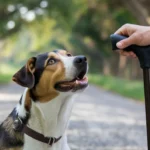If you’ve noticed your dog acting more anxious lately, you’re not alone. Many pet owners struggle to understand why their dogs seem stressed or fearful—and what they can do about it. The good news is that there are practical steps you can take to help ease your dog’s anxiety and improve their overall well-being.
Why Is My Dog So Anxious?
Dogs can experience anxiety for a variety of reasons, including:
Changes in Routine: Dogs thrive on consistency. Moving homes, adding a new family member, or even altering daily schedules can trigger stress.
Loud Noises: Thunderstorms, fireworks, or loud construction sounds can be terrifying for some dogs.
Separation Anxiety: Some dogs struggle when left alone and may bark, chew, or exhibit other destructive behaviors.
Health Issues: Pain or discomfort from an underlying medical condition can also manifest as anxiety.
Lack of Socialization: Puppies who weren’t properly socialized may grow up feeling nervous around people, animals, or unfamiliar environments.
How Can I Help My Anxious Dog?
1. Create a Safe Space
- Designate a quiet area in your home where your dog feels secure. This could be a cozy corner with a comfortable bed, toys, and familiar scents.
- Use calming tools like weighted blankets or anxiety wraps if needed.
2. Establish a Routine
- Dogs feel safer when they know what to expect. Set regular times for feeding, walking, and playtime to provide structure.
3. Use Positive Reinforcement
- Reward calm behavior with treats, praise, or affection. For example, if your dog stays relaxed during a thunderstorm, give them a treat to reinforce this behavior.
4. Practice Desensitization
- Gradually expose your dog to things that scare them at low levels. For instance, if loud noises upset your dog, play recordings of thunderstorms softly and increase the volume over time while rewarding calm responses.
5. Provide Mental Stimulation
- Keep your dog’s mind busy with puzzle toys, obedience training, or scent games. A tired brain is often a happy one!
6. Consider Natural Remedies
- Some pet parents find success with natural remedies like CBD oil, herbal supplements (e.g., chamomile), or pheromone diffusers designed to mimic calming hormones.
7. Consult Your Vet
- If your dog’s anxiety persists or worsens, consult your veterinarian. They can rule out any underlying health issues and discuss medication options if necessary.
When Should You Seek Professional Help?
If your dog’s anxiety seems severe or doesn’t improve despite your efforts, consider reaching out to a professional:
- Animal Behaviorist: A specialist who can create a personalized plan to address specific fears or triggers.
- Trainer: A certified trainer can teach you techniques to manage and reduce anxiety through positive reinforcement.
Final Thoughts
Anxiety in dogs is real, but it’s manageable with patience, consistency, and love. By understanding the root cause of your dog’s stress and taking proactive steps to alleviate it, you can help them live a happier, healthier life. Remember, every dog is unique, so don’t hesitate to tailor solutions to fit your furry friend’s needs.









